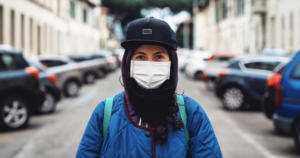
As states reopen, you may find yourself feeling anxious about even entertaining socializing in public again. Psycho-Social experts say these simple tips may help:
- Anxiety disorders are the most common mental illness in the United States, affecting 40 million adults, according to the Anxiety and Depression Association of America.
- Getting back into a social routine after isolating may bring about anxiety.
- Socializing at your own pace and practicing self-care can help ease social anxiety.
Since your social calendar has been blank for the last few months, filling it back up can feel exciting — but it can also cause a great deal of social anxiety.
The change from having a few social interactions with family to engaging with colleagues, strangers, and even friends can be superbly stressful for one’s mental health and “may cause many people who are normally extroverted to feel like they are becoming introverted and now they’re not wanting to mix with others,†Jana Abelovska, medical advisor says.
Emily Anhalt, PsyD, agrees and states “that isolation is emotionally draining and can feed into social anxiety.”
“We are not gathering experiences that disprove our worries; there’s no gradual exposure [to our worries]. Normally when you are being social in a regular way, you are having some of your worries disproven. You’re getting used to them. You have a chance to try different things and see what helps with your worry, but now that we are all on our own, jumping back into the unknown poses its own set of anxiety.â€
As you begin to socialize in person more, the following eight tips can help put your anxiety at ease.
1. Go Slowly
Dr. Allie R. Shapiro, psychiatrist with Community Psychiatry, says to slowly enter into social life, especially if you’ve been diagnosed with Social Anxiety.
“This will help you to ease into situations that were previously uncomfortable. As quarantine ends, the auto-avoidance will also end, necessitating an introduction back into situations you deeply fear. That’s not a leap anyone should take all at once.â€
2. Begin with the Familiar
“That circle of family members (or a few close friends) is your comfort space, and people you feel most like yourself with and can be honest with and who you trust,†Anhalt said.
Eventually, you’ll feel like expanding your circle to include people and situations that have previously made you anxious. Exposure to stressors in small but ever-increasing ways can help.
“[The idea is to] give yourself a little taste of something that makes you anxious and then wait for the anxiety to calm down. Then increase your exposure a little more and wait for the anxiety to come down,†Anhalt said.
3. Resist Turning to Quick Escapes
Learning to self-soothe before, during, and after anxious encounters also helps fortify inner stability.
Although alcohol may seem to temporarily reduce symptoms of social anxiety, alcohol can actually exacerbate symptoms of the disorder within just a few hours of consumption such as anxiety, irritability, and depression.
NOTE: If you go to restaurants or bars, be safe; remember to observe physical distancing and wearing masks (vaccinated or not!).
4. Use Your Imagination
Shapiro recommends preparing for upcoming social events by role-playing specific worries or concerns with someone you trust, even practice with a script (no more than a few sentences).
“Visualize your friend when you see them and what you will say. It may be awkward at first, especially as we are not able to hug or touch friends, but you will soon adapt to the new way of greeting a loved one,†she said.
Walking outside or playing a game can create greater ease for talking with another. Of course, warmer weather makes this easier.
5. Accept the Fear
Who wouldn’t be afraid? We continue to live in a context that has its own danger and more than 1,000,000 have died from COVID-19 world-wide.
“You may feel slightly embarrassed about these feelings, especially if you are usually the life and soul of the party, but there’s no shame in feeling slightly overwhelmed by the changes, especially after so much time spent alone,†Abelovska said.
“Remember, no one has ever been through anything like this in the modern world, so no one really knows how to do it ‘right.’ Even the experts don’t have all the answers, so it’s normal to have your own uncertainties and doubts,†Shapiro said.
6. Honor Your Comfort Zone
“You’re not obligated to do anything that makes you feel uncomfortable or puts you at risk. There are a lot of different factors that will affect when you feel it’s the best time to start venturing out. Think about your age, health history, quarantine situations, and even your own anxiety when taking that next step outside,†Shapiro said.
“There is so much unknown about what is ultimately safe, and some of our fears about being out in the world are actually warranted, so it’s a good idea to be thoughtful about who you are engaging with socially and understand if they are [on the same page] as you are,†she said.
7. Practice Extreme Self-Care (ESC)
Prioritizing your physical health, learning breathing exercises, developing self-reflective practices like therapy and journaling, and talking to friends and family about your worries are all practical parts of anxiety management, says Anhalt.
“While we don’t have a playbook, we can rely on coming back to ourselves and the present moment and making sure we have [reliable] spaces in our lives so we can navigate the spaces that feel out of our control,†she said.
“You might not be able to prepare for everything you’re going to encounter, but you can get your body and mind ready to handle difficult things beforehand. This will put you in a better position to navigate anything that comes your way,†Anhalt said.
8. Use MCS Counselors
If you’ve tried all you can to assimilate back into some form of socializing but anxiety and panic are interfering with your ability to do so, it may be time to reach out to our mental health professionals; MCS Counselors can help.
